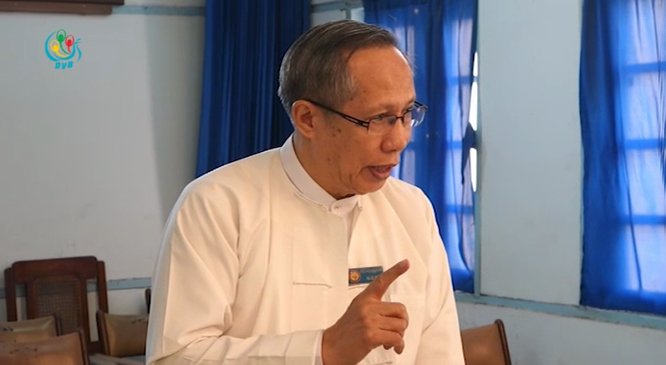DVB speaks with Han Shwe, a central committee member of the National Unity Party (NUP), which was recognised as the proxy party of the ruling State Law and Order Restoration Council during the era of military junta.
Although it won over 21 percent of the national vote in 1990, the NUP won just 10 seats in the lower house, trounced by Aung San Suu Kyi’s National League for Democracy (NLD), which took 392 constituencies.
Although the ruling generals refused to recognise the NLD’s victory and clung to power, the NUP became increasingly irrelevant in Burma’s political landscape. The new generation of military leaders set themselves up behind the Union Solidarity and Development Party (USDP) under Thein Sein. In 2010, the NLD boycotted the elections, and the USDP swept to power in polls that were dismissed as fraudulent by observers. The NUP retained its popularity with the ‘old guard’ of the military regime, but in winning only 12 seats in the pyithu hluttaw (lower house), it was clear that the NUP had been eclipsed.
DVB asks Han Shwe whether he believes the NUP is a main contender this year, and who he considers his main opponents.
Q: Is the NUP ready to compete in the upcoming 2015 elections?
A: Pretty much. We are planning our participation in the elections in two parts: preparations in the months ahead of the elections until July, and an intensive three-month campaign period in August, September and October.
Q: How many candidates do you plan to field in the elections?
A: At the moment, we are looking to compete in 142 townships across the country, fielding between 400 and 500 candidates in both upper and lower houses constituencies. We are looking to place candidates in each of the regional assembly seats within those 142 townships, but in the light of the rumours that the upper house is looking to propose a bill to accept a PR [proportional representation] voting system, all political parties may have to readjust their assignment of candidates, so we have not made a definitive decision yet.
Q: Regarding the election laws, are there any rules or regulations the NUP would like to see changed?
A: Not so much with the elections law, but we have raised concerns about the bylaws twice already in meetings between the Union Election Commission (UEC) and political parties. We propose lowering registration fees for candidates from 500,000 kyat to 300,000 kyat [US$500 to $300], and only allowing a 30-day period for election campaigning – although the campaign period was raised to 60 days upon requests from other parties.
Q: Much criticism has been directed at the UEC’s formation and credibility, such as its inclusion of former military personnel and individuals with ties to the USDP. What is your opinion on the commission?
A: What we and other political parties can do now is ensure rule of law, i.e. election rules, bylaws and the Election Commission Law. If the procedures are in accordance with these rules and regulations, then we don’t see why we cannot accept all the UEC members regardless of their status as former military personnel, but we would not accept anyone in the UEC – whether a former military man or a civilian – making rules of their own accord.
We are planning to sit with other political parties to discuss a code of conduct with regard to the elections, to be followed by the UEC as well.
The UEC chairman has urged representatives of political parties, media and civil society organisations to offer suggestions on electoral procedures, and is considering inviting domestic and foreign observers to monitor the polls. If these matters are implemented then we shouldn’t have much to complain about.
While we do not like the fact that the USDP are allowing their members to resign and join the ranks of the electoral body – which we see as an exploitation of a loophole in the law – as long as they meet the qualifications, we will accept them.
[related]
Q: Who do you think will be the main competition for the NUP in the upcoming elections – the USDP or NLD? What is your strategy?
A: I think both the USDP and NLD will be strong opponents, which means we may struggle. Also, with more and more ethnic-based parties joining the fold, it will be a challenge to compete against them in ethnic areas. Overall, we expect this year’s election will be much more challenging for us compared to the 1990 and 2010 elections.



